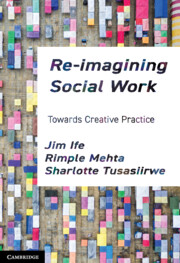17 results
4 - Indigenous world views
-
- Book:
- Re-imagining Social Work
- Published online:
- 07 December 2023
- Print publication:
- 21 December 2023, pp 53-76
-
- Chapter
- Export citation
3 - Decentring the human
-
- Book:
- Re-imagining Social Work
- Published online:
- 07 December 2023
- Print publication:
- 21 December 2023, pp 30-52
-
- Chapter
- Export citation
1 - Setting the scene
-
- Book:
- Re-imagining Social Work
- Published online:
- 07 December 2023
- Print publication:
- 21 December 2023, pp 1-18
-
- Chapter
- Export citation
9 - Radical social work
-
- Book:
- Re-imagining Social Work
- Published online:
- 07 December 2023
- Print publication:
- 21 December 2023, pp 157-173
-
- Chapter
- Export citation
References
-
- Book:
- Re-imagining Social Work
- Published online:
- 07 December 2023
- Print publication:
- 21 December 2023, pp 174-201
-
- Chapter
- Export citation
8 - Technology
-
- Book:
- Re-imagining Social Work
- Published online:
- 07 December 2023
- Print publication:
- 21 December 2023, pp 139-156
-
- Chapter
- Export citation
Acknowledgement of Country
-
- Book:
- Re-imagining Social Work
- Published online:
- 07 December 2023
- Print publication:
- 21 December 2023, pp i-ii
-
- Chapter
- Export citation
7 - The sacred
-
- Book:
- Re-imagining Social Work
- Published online:
- 07 December 2023
- Print publication:
- 21 December 2023, pp 123-138
-
- Chapter
- Export citation
Copyright page
-
- Book:
- Re-imagining Social Work
- Published online:
- 07 December 2023
- Print publication:
- 21 December 2023, pp iv-iv
-
- Chapter
- Export citation
Acknowledgements
-
- Book:
- Re-imagining Social Work
- Published online:
- 07 December 2023
- Print publication:
- 21 December 2023, pp ix-x
-
- Chapter
- Export citation
About the authors
-
- Book:
- Re-imagining Social Work
- Published online:
- 07 December 2023
- Print publication:
- 21 December 2023, pp vii-viii
-
- Chapter
- Export citation
6 - Beyond (social) science
-
- Book:
- Re-imagining Social Work
- Published online:
- 07 December 2023
- Print publication:
- 21 December 2023, pp 106-122
-
- Chapter
- Export citation
Contents
-
- Book:
- Re-imagining Social Work
- Published online:
- 07 December 2023
- Print publication:
- 21 December 2023, pp v-vi
-
- Chapter
- Export citation
Index
-
- Book:
- Re-imagining Social Work
- Published online:
- 07 December 2023
- Print publication:
- 21 December 2023, pp 202-206
-
- Chapter
- Export citation
2 - Centring the human
-
- Book:
- Re-imagining Social Work
- Published online:
- 07 December 2023
- Print publication:
- 21 December 2023, pp 19-29
-
- Chapter
- Export citation
5 - Decolonising social work
-
- Book:
- Re-imagining Social Work
- Published online:
- 07 December 2023
- Print publication:
- 21 December 2023, pp 77-105
-
- Chapter
- Export citation

Re-imagining Social Work
- Towards Creative Practice
-
- Published online:
- 07 December 2023
- Print publication:
- 21 December 2023
-
- Textbook
- Export citation



